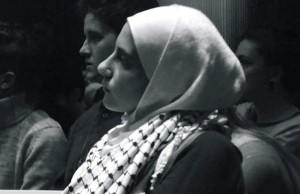Prescription for Relief
By Aliyyah I. Abdur-Rahman
A few weeks ago I attended an exhibit at the Skylight Gallery at Restoration Plaza in Brooklyn, called “Sex Crimes against Black Girls.” The exhibit, curated by Shantrelle P. Lewis, was inspired by the seminal essay “’The Permanent Obliquity of an In(pha)llibly Straight’: In the Time of Daughters and the Fathers” by our very own inimitable Hortense Spillers. The exhibit, an attempt to publicize and to prevent sexual violence in the global black community, featured the work of Nyoka Acevedo, Kimberly Kimabe Becoat, Frances Bradley, Delphine Fawundu Buford, Tracee Worley, Numa Perrier, Wahala Temi, and Noelle Lorraine Williams.
As I perused the various pieces, stopping to study each one (though unable to participate in the interactive installation that called for visitors to “beat” the vagina piñata as a comment on the rhetorical violence done to normative sex in some black communities), I realized again how absolutely devastating and very near deranging it is, reckoning with sexual violence. This art is so important, I reminded myself, for how else would we narrate the misshapen world? How else would we trace the frustration of convoluted, awful beginnings; the impossibility of a way forward or a way out; what can feel like the last days on earth, or of earth itself; or how so many of our things of beauty come from an original period of horror?
There was an important, coincidental timing of the exhibit with the recent headlines about grown men and male minors colluding to gang-rape girl children, as young as 11 years old. Do I need to remind you of what an 11-year-old girl-child looks like: how narrow her wrists, the utter lack of hips no matter her size, how her neck has only begun to stretch, the belly and brain that cannot accommodate any of this for she is, after all, only in the sixth grade?
There are at present two headlines: The first gang-rape was alleged to have taken place in Cleveland, Texas, to have been perpetrated against an 11-year-old Latina child, and to have involved approximately 18 boys and men. The second was alleged to have occurred in Moreno Valley, California, where an 11-year-old girl was lured by an older girl to a park bathroom in which seven alleged gang members took turns raping her. I am anguished imagining the harm that befell these girls, imagining the putrid spaces in which their innocence was left, imagining the time and effort their bodies and their psyches will take to heal. “You can ruin someone’s life…”
The heartbreak that I feel for girls that make the headlines is multiplied exponentially for the overwhelming number of other girls who don’t. Sickeningly, one in three women will be raped in her lifetime. Only half of all rapes are reported to the authorities. Most often the assailants of women and girls are not strangers, but people they know. Perpetrators of sexual violence are our brothers, uncles, neighbors, cousins, fathers, sons, husbands, our religious leaders. And, since men overwhelmingly do the raping, men must take a lead role in ending it.
There are many things I love about my upbringing, about being raised Sunni Muslim, about being my father’s child. There is a mandate for modesty in Islam, and this mandate guides both self-conception and social relations. So there was some space, some inviolable time-space continuum in which my woman growth happened, protected and untouched. From my earliest memory until the morning when I kissed his glowing, shrouded face in his coffin, my father had remained at a cool, masculine distance.
I hadn’t known that I was his dear girly girl (one of eight daughters)—though he attended all of my significant events, complained often about my diet, laughed me through child labor, offered to buy me nicer shoes and coats than I could afford for myself, told me stories about Malcolm X and James Baldwin just to see me marvel, prayed often for me and for my son—until I heard him one day in heated conversation with a man who had hurt me in the way some men hurt some women. My father hollered at that man, howled really, that he would give his life for me, right then, right there, for me, his daughter. And, though his voice was loud and round with the severity of his threat, my father’s voice was also cracking under the pressure of an impending wail.
My father’s voice that day, my father’s love each day, is the armor that shapes and shadows my existence as a woman. (The yin and the yang, baby!) And it occurs to me that it was my father who gave me my strongest sense of how we correct and heal a culture bent on the premature sexualization and violation of its own children. The men among us must partake in the secure and sustained appreciation and protection of girl-, boy- and personhood.
First, all healthy and sane men must do their part to rear their boy and girl children, and the boy and girl children around them. Collectively, we must end the commercial traffic in music and other cultural products that objectify women and glorify rape—how can anyone stomach the vocal stylings of an artist who urinates on children? Rather than simply rush to vindicate sons, brothers, uncles, fathers who perpetuate sexual violence as some have done in the gang-rape case in Texas, we must hold them accountable: sexual violence is a matter for the police.
Once their mouths can form the descriptions of what happened to them, we must grant our credence and lend our time and resources to helping girls and women heal from sexual violence. We must convene safe spaces for reporting sexual violence and adopt strategies for the punishment and rehabilitation of sexual assailants. And despite the culture of misogyny in which we live, we must (must, must) raise feminist daughters and sons.
For more information about how you can get involved see:
UpTown Notes: Let’s Talk About Sex(ual Violence)
Little Girl Loved: A Letter For the Cleveland, Texas Child–From a Black Father Who Cares
In Defense of Our Daughters: Brothers Against Sexual Violence (Video)
__________________________________
 Aliyyah I. Abdur-Rahman is Assistant Professor of English at Brandeis University. Her areas of scholarship include African American literature and culture, multi-ethnic feminisms, critical race theory, and the intersection of religion and political struggle. A two-time winner of the Darwin Turner Award for Best Essay of the Year in African American Review, she has published widely on topics ranging from the relation of sexuality and social order in slave narratives to the impacts of Civil Rights retrenchment on black familial formation and function in present day.Abdur-Rahman’s first book, The Erotics of Race: Identity, Political Longing, and Black Figuration, is forthcoming from Duke University Press. She has recently begun research on a new book project, tentatively titled, Millennial Style: The Politics of Experiment in Contemporary African American Culture.
Aliyyah I. Abdur-Rahman is Assistant Professor of English at Brandeis University. Her areas of scholarship include African American literature and culture, multi-ethnic feminisms, critical race theory, and the intersection of religion and political struggle. A two-time winner of the Darwin Turner Award for Best Essay of the Year in African American Review, she has published widely on topics ranging from the relation of sexuality and social order in slave narratives to the impacts of Civil Rights retrenchment on black familial formation and function in present day.Abdur-Rahman’s first book, The Erotics of Race: Identity, Political Longing, and Black Figuration, is forthcoming from Duke University Press. She has recently begun research on a new book project, tentatively titled, Millennial Style: The Politics of Experiment in Contemporary African American Culture.





6 Comments